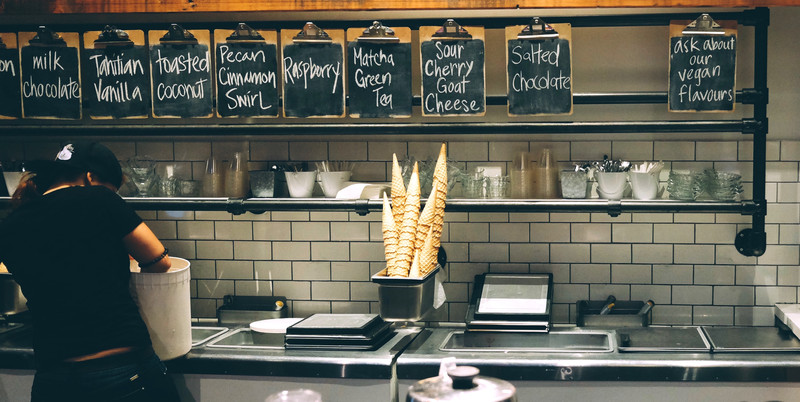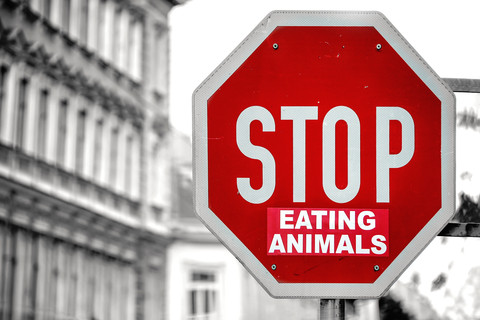https://euobserver.com/environment/139869
Meat 'taboo' debated at Bonn climate summit

Several studies show that vegan diets have the lowest carbon footprints (Photo: Alex Robert)
Participants at the Bonn climate change conference met on Monday (13 November) to discuss a source of greenhouse gas emissions that is reportedly doing more to damage the climate than the transport sector - yet is largely neglected by policymakers in Europe and beyond.
Agriculture, and in particular animal agriculture for the production of beef and dairy, has for years been climate action's big taboo.

(Photo: Simon Matzinger)
But reducing meat consumption can significantly reduce one's carbon footprint, said researcher Helen Harwatt.
She presented a study she co-wrote and which was published early this year.
The study said that if all Americans were to substitute their beef consumption for beans, the United States could achieve between 46 and 74 percent of its 2020 greenhouse gas emissions reduction goal.
If people care about the US leaving the Paris agreement, they should also care about the impact of their diet on climate change, said Harwatt.
The most recent climate change report of the Intergovernmental Panel on Climate Change (IPCC) said the entire agriculture sector was responsible for between 10 and 12 percent of all greenhouse gas emissions. Other studies have since said this share was expected to rise.
But Monday's event was still something of a novelty.
"I think this is the very first event that has been totally dedicated to this topic," said Cristina Tirado von der Pahlen, one of the other panellists.
Tirado is one of the hundreds of authors of the IPCC report and said it was "really an achievement" that a side-event on the subject was organised at the United Nations climate summit in Bonn, known as Conference of the Parties (COP).
Three other participants also said they thought it was the first time such a side-event was held at a COP, which is now held for the 23rd time.
Brushed under the carpet
Given that hundreds of side-events are held at each COP, why is it that a major source of greenhouse gas emissions was kept off the table for so long?
"This was an issue that was really brushed under the carpet," said Ruchir Sharma, head of communications at ProVeg International, one of the organisers of the event.
"Because no government wants to leave a COP and go back and tell their people what to eat on their plates."
But not talking about how to reduce emissions from meat and dairy production leaves "a huge gap in our mitigation strategy", Sharma told EUobserver in an interview.
"It is a very big missed opportunity."

He noted that shifting diets towards more plant-based foods will help countries to quickly reduce their carbon emissions.
But that is a tricky concept.
The 2015 Paris climate agreement only very carefully and very indirectly mentioned in its preamble that the signatories – which include the European Union – "[recognise] that sustainable lifestyles and sustainable patterns of consumption and production, with developing country Parties taking the lead, play an important role in addressing climate change".
In the European Union, there is very little appetite to encourage people to eat less meat. Even modest proposals to do something about food waste appear to be controversial
Last September, EUobserver reported that national governments were resisting a proposal by the European Parliament to be required to set up systems to donate unsold food to charitable organisations.
A classified document from October, seen by this website, confirmed that EU governments are still resisting the idea.
They also do not want to lay down specific food waste reduction targets.
Agriculture lobby
Some argue that the European Union is actually making things worse, through its common agricultural policy (CAP).
"The European Union through the CAP is massively subsidising the wrong sort of food, beef and dairy," said Ian Lumley of the National Trust for Ireland.
He told EUobserver that the agricultural lobby "is as vicious as the oil and gas lobby and needs to be treated accordingly".
Lumley, from Ireland, said politics in his country were "captured by the power of that lobby group".
He was sitting in the audience at the panel discussion, modestly titled 'Reducing livestock's long shadow: Opportunities to keep warming well below 2C'.
"We're far too polite about this," he told the panellists and fellow audience members, and made a comparison to the role of coal in energy production.
Coal is the most CO2-intensive of the fossil fuels, and several European states have planned or are considering to phase them out.
Lumley said a similar phase-out should be introduced for beef.
"What I'm putting to you all is to get serious about the global impact of animal agriculture."
"Let's come out with it. Global animal agriculture needs an exit strategy. If the target in the Paris agreement is to be met, that exit strategy should be as rapid as is needed for coal, oil, and gas," said Lumley, whose remarks were met with applause and whoops.
No forced veganism
There are some reasons for optimism that the issue is going to be taken seriously, said ProVeg International's spokesman Ruchir Sharma.
He pointed to a new law that was introduced in Portugal earlier this year.
The Mediterranean EU member has made it mandatory for government institutions to offer a vegetarian meal in their canteens.
"We don't need everyone to go vegan overnight. But give people the choice, and a fair choice, to choose food themselves," said Sharma.
He noted that eating meat on a daily basis in Europe is a recent phenomenon, which flourished only since the end of the Second World War and since the CAP was introduced.
"If such a dramatic change could be achieved in one and a half generations, simply through an incentive structure that affects people's pockets, it can be reversed as well," the spokesman said.
But there is a long way to go.
The event drew fewer than 200 of the almost 20,000 registered COP participants.
And even the canteen at the Bonn climate change venue is setting the wrong example.
On the first day, Monday 6 November, the beef meal was priced at €3.50, while the vegetarian meal – pasta and a tomato sauce – was priced €6, which gave the price signal that consumers should go for the more polluting option.
A week later, the meat dish was €7. Still several vegetarians complained to this website about the "uninspirational" and nutrition-poor "veggie meal" of that day – a €6 pancake with vanilla sauce.
After publication of this article, it emerged that there had been a meat-themed event at a COP before: 'Meat: The Big Omission from the Talks on Emissions', organised at COP21 in Paris. The headline has been amended to reflect that Monday's event was not the first time ever. Nevertheless, the fact that this was not known among the participants of Monday's debate, reaffirms that the topic has been largely invisible until now.

沒有留言:
張貼留言